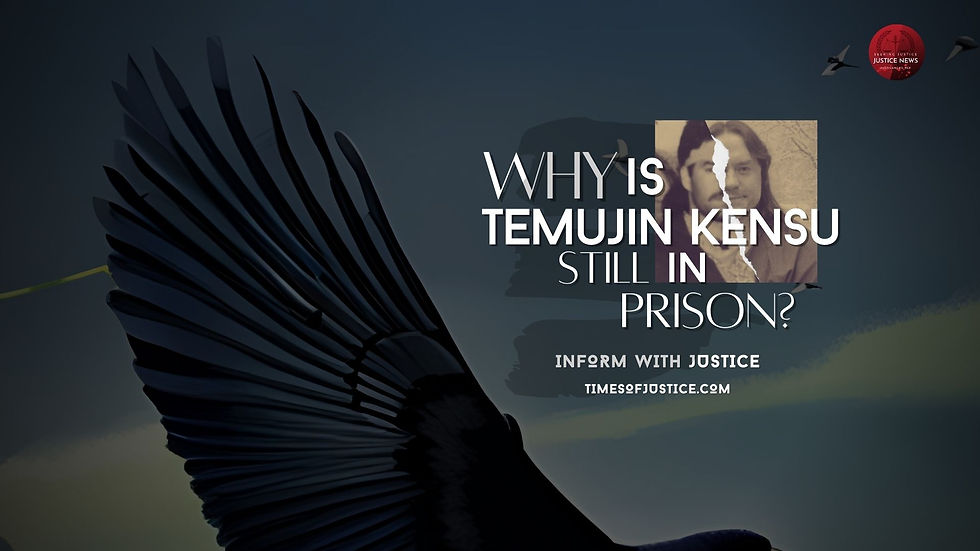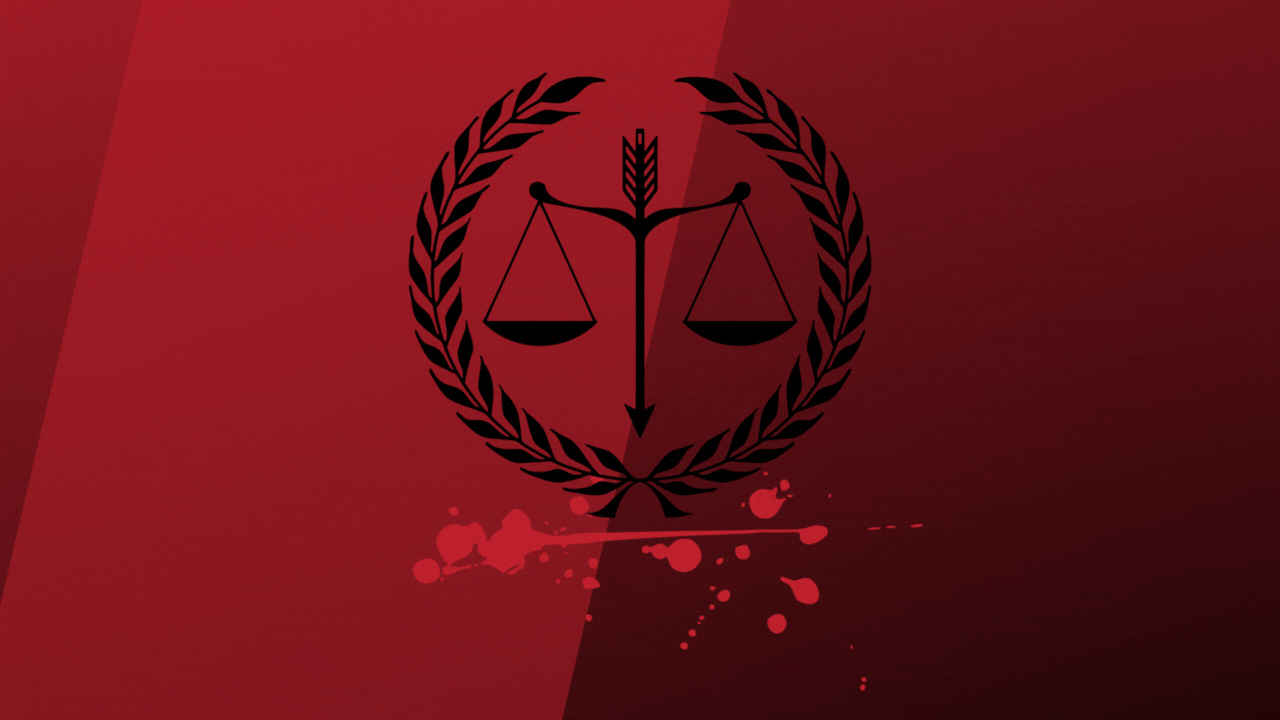After 35 Years of Fighting A War Temujin Kensu Is Still In Prison Maintaining His Innocence
- Justice News

- Mar 20, 2023
- 10 min read
Updated: Sep 16, 2023
Kensu has upheld his innocence claim for over 3 decades now and all the specialists and law experts and attorneys and professors and a few lawmakers and some judges agree. But it's not just what the experts say, it's about what matches the data, timelines, and facts.
20 March 2023 | Imran Siddiqui | Justice News | Washington D.C.
Why is temujin kensu not a freeman?
The case of Temujin Kensu, also known as Fred Freeman, is a glaring example of the injustices of the American criminal justice system, and many experts agree with this statement. Despite spending 35 years in a Michigan prison for a crime he argues he did not commit, which all the facts prove, and yet Temujin Kensu is still incarcerated. The evidence clearly shows that he was not the shooter of Scott Macklem, who was killed in 1986 in Port Huron Michigan, and that Temujin was 400 miles away from the crime scene at the time of the murder. However, there are several reasons why this injustice continues today.

To begin with, the legal system is designed to prioritize finality over fairness. Once a conviction has been handed down, it is incredibly difficult to reverse it. The appeals process is unfairly long and wickedly arduous, and even if new evidence comes to light that exonerates the defendant, it can take years, if not decades, to have the conviction overturned.
In the case of Temujin Kensu, it took two decades of legal battles to get a hearing on the new evidence that proves his innocence. In 2010. U.S. District Judge Denise Page Hood ordered a new trial for Temujin Kensu but her ruling was overturned by an appeals court, even after Judge Denise had discovered egregious prosecutorial misconduct and many other issues with the 1987 trial. This clearly indicates the system's reluctance to admit its mistakes and correct them in a timely manner.
Second, there is a lack of political will to reform the criminal justice system. Despite the growing awareness of the flaws in the system, there has been little political action to address them. This is partly due to the fact that the issue of criminal justice reform is often seen as a political liability. Politicians are reluctant to be seen as "soft on crime" and are more interested in maintaining the status quo than in addressing the underlying problems. As a result, innocent people like Temujin Kensu are left to languish in prison, while the real perpetrators of crimes are free to roam the streets.

Third, there is a lack of resources for the wrongly convicted and their families. Once a person has been convicted of a crime, they often become a pariah in society. They may struggle to find work, housing, and support from their community even when released. This is particularly true for those exonerated after spending years in prison. They are often let go with nothing more than a bus ticket and a small amount of money or maybe not even that. They may have lost their fa}milies, their friends, and their support networks. This can make it incredibly difficult for them to adjust to life outside of prison and to rebuild their lives. In the case of Temujin Kensu, his lack of resources and support has made it difficult for him to fight for his freedom despite the fact that many have come out in his support yet there is a lack of local Michigan rectitude and a national decadence to stand up for the innocent as a moral mobilization.
Fourth, there is a bias against the wrongfully convicted. Despite the growing awareness of the issue of wrongful convictions, there is still a tendency to view those who have been convicted of crimes as guilty, even in the face of new evidence. This bias can make it difficult for the wrongly convicted to get a fair hearing in court and to have their claims taken seriously. It can also make it difficult for them to get support from the media and the public, who may be skeptical of their claims of innocence.

One major factor is "Peer Protection", those in power protect their friends and their circles even when those friends may have been involved in prosecutorial misconduct or any other criminal act. They protect each other for whatever gains that might suit them so the legacy of this wickedness flourishes in the home of the enslaved and the land of the cowards.
The case of Temujin Kensu is a tragic example of the flaws in the American criminal justice system. Despite overwhelming evidence of his innocence, he is still incarcerated after spending 35 years in prison. The reasons for this injustice are complex, but they include a legal system that prioritizes finality over fairness, a lack of political will to reform the system, a lack of resources for the wrongly convicted, delay in holding bad prosecutors and judges accountable, peer protection, and a bias against those who have been convicted of crimes. It is time for society to recognize these flaws and take action to ensure that innocent people like Temujin Kensu are not left to suffer the consequences of a broken system.
What measures should be taken and strategies implemented in order for Temujin Kensu to achieve his freedom and exoneration?
There are several steps that can be taken and strategies that should be implemented to ensure that Temujin Kensu achieves his freedom and exoneration.
Advocacy and public awareness: One of the key strategies to securing Temujin Kensu's freedom is to increase public awareness of his case and to advocate for his release. This can involve building an online media empire of his own, using audio and visuals to tell the story, reaching people's homes directly, working with advocacy groups, galvanizing public events, reaching out to the media, and using social media to share his story. This increased visibility can help to put pressure on the legal system to review his case and to recognize the injustice of his wrongful conviction.
Fierce legal representation: Temujin Kensu needs to have access to proficient and competent legal warriors as representatives to help him bulldoze through the legal system just like how they railroaded him. They must ensure that his case is heard, and continuously fought, time and time again, using all legal means possible. This will demonstrate commitment to other wrongfully convicted individuals and their families and legal experts and organizations that those who are in the legal services still believe in the fight for the innocent and not just do lip service.
Prosecutorial and jury misconduct: Temujin Kensu's legal team can scan through all the past public posts and on-the-record statements of jury members involved in his trials and see where the discrepancies are. If one jury bias is discovered chances are there could be more and the conviction can get thrown out of the window.
Pursuing a national movement: A national movement should be devised to set in motion a cascade of locally organized events where the case of Temujin and similar cases of wrongful convictions can be highlighted to create a mass movement of supporters to pursue his exoneration and freedom.
Supporting systemic reform: It is important to recognize that Temujin Kensu's case is not an isolated incident. There are countless other individuals who have been wrongfully convicted and who are still incarcerated. Supporting systemic reform can help to address the root causes of wrongful convictions and to prevent future injustices. This can involve advocating for and then bringing and implementing changes to the legal system, supporting organizations that work to reform the system, and working to raise awareness of the issue of wrongful convictions.

Securing Temujin Kensu's freedom and exoneration will require a multifaceted approach that involves advocacy, forceful legal representation, post-conviction alternatives, pursuing compensation, galvanizing public events to generate momentum, and supporting systemic reform. It will be a long and difficult journey, but it is a necessary one in the pursuit of justice and in the fight against the injustices of the criminal justice system.
What role can the people and the state of Michigan play in securing Temujin's freedom and what should the legal system and the Governor of Michigan do to bring justice to an innocent man?
The people and the state of Michigan can be crucial in securing Temujin Kensu's freedom and exoneration. The following are some of the ways in which they can contribute to this effort:
Advocacy and public awareness: The people of Michigan can raise awareness about Temujin Kensu's case and advocate for his release. This can include contacting their elected representatives, writing letters to the governor and other state officials, and organizing rallies by using social media to raise awareness about his innocence.
Pressure on the legal system: The legal system in Michigan can play a key role in securing Temujin Kensu's freedom. Judges, prosecutors, and other legal officials should review his case and take action to correct the injustice that has been done. The legal system should be pressured to re-examine the evidence in his case and to acknowledge the new evidence that proves his innocence.
Support from the Governor: The Governor of Michigan has the power to grant clemency to Temujin Kensu and to commute his sentence. The governor can also order a new trial or pardon him if it is determined that he was wrongfully convicted. The governor should be repeatedly urged to review his case and to take action to correct the injustice that has been done.
Pressure on Legal representation: Temujin Kensu needs competent legal representation to help him steer the legal system and to present the new evidence that proves his innocence. The legal system in Michigan should ensure that he has help in seeking justice and that he is not derailed.
Systemic reform: The state of Michigan can take steps to address the root causes of wrongful convictions and to prevent future injustices. This can involve implementing reforms to the criminal justice system, such as improving forensic science, increasing transparency in investigations, fair trials, and improving access to legal representation for those who cannot afford it.

The people and the state of Michigan can contribute to securing Temujin Kensu's freedom and exoneration by advocating for him, pressuring the legal system to review his case, supporting him with competent legal representation, urging the governor to take action, and supporting systemic reform to prevent future injustices. The legal system and the governor of the state should take action to bring justice to an innocent man and correct the injustice that has been done for over 35 years.
What are the alternatives if none of the above worked so far?
If the strategies mentioned above do not work to secure Temujin Kensu's freedom and exoneration, there are still some options that could be sought.
International attention: If local and national efforts fail to secure Temujin Kensu's release, international attention may be able to help. Human rights organizations, foreign governments, and the United Nations could all be approached to bring attention to his case and to put pressure on the legal system to review his case and release him considering all the evidence gathered so far.
Civil litigation: If other avenues fail, civil litigation may be an option to seek damages for his wrongful conviction. This can involve filing a lawsuit against the government or other parties responsible for his wrongful conviction and seeking compensation for the harm caused by his imprisonment.
Hold them accountable: Take them all to court instead by pursuing litigation against those who are involved in the continued wrongful imprisonment of Temujin Kensu using all available lawful means and legal apparatus.
Continued advocacy and public awareness: Even if other strategies fail, it is necessary to continue advocating for Temujin Kensu's release and to raise awareness about his case. This can involve working with the parties involved, such as the state, and advocacy groups, reaching out to the media, and using social media to spread his story. This increased visibility can help to put pressure on the legal system to review his case and to recognize the injustice of his wrongful conviction.

It is significant to note that these alternatives may not guarantee Temujin Kensu's freedom and exoneration, and may require substantial resources and time to pursue. However, they are important options to consider if other strategies have failed to secure justice for an innocent man.
What could be an exit plan to secure Temujin's freedom?
Mobilize public support: Street teams, advocacy groups, activists, and concerned citizens should be mobilized to support the effort to secure Temujin Kensu's freedom. This could include organizing rallies, protests, and other events to raise awareness about the case and put pressure on the legal system.
Engage with elected officials: Local and national elected officials should be contacted to seek their support for Temujin Kensu's release. This could include reaching out to representatives in the state legislature, as well as members of Congress and the U.S. vice president, and the president of the United States.
Keep petitioning the governor for clemency: If efforts to secure a new trial fail, a petition for clemency should be filed with the governor of Michigan, if that fails, file another and the next. These petitions should present a compelling case for Temujin Kensu's innocence and the need for executive intervention to secure his release.
Pursue legal action: If all other avenues lead you to a dead-end, legal action may be pursued to seek damages for the wrongful conviction. This could include filing a civil lawsuit against the government or other parties responsible for the injustice.

Securing Temujin Kensu's freedom and making sure he doesn't stay in prison will require a comprehensive and strategic exit plan that includes a hard review of the previous game plans, gathering new evidence, filing motions for new trials, going at it from all directions, mobilizing public support, engaging with elected officials, petitioning the governor for acquittal, and pursuing legal action if necessary.
What if all of the above fail?
If all of the above steps fail to secure Temujin Kensu's freedom and exoneration, there are other alternatives that can be pursued.
Continued advocacy and public awareness: Even if other strategies fail, it is important to continue advocating for Temujin Kensu's release and raise awareness about his case, and not lose momentum or the urgency. Kensu would do that for you.
Pursue federal intervention: If all other options fail, it is possible to get federal intervention in the form of the FBI, Federal Bureau of Investigation, the Justice Department, and the Supreme Court to intervene on the basis of a clear and persistent obstruction of justice, seeking correction to provide legal remedies and a thorough review of the case to potentially overturn this wrongful conviction.

These choices may not guarantee Temujin Kensu his freedom and exoneration and may require significant resources and time to pursue. However, in earnest, they are very meaningful options to consider if other strategies have failed so far to finally secure justice for an innocent man.
| Imran Siddiqui is the managing editor at Justice News and the author of The JBlog. Imran's podcast FairPlay Challenging Wrongful Convictions airs on J107Justice Radio





